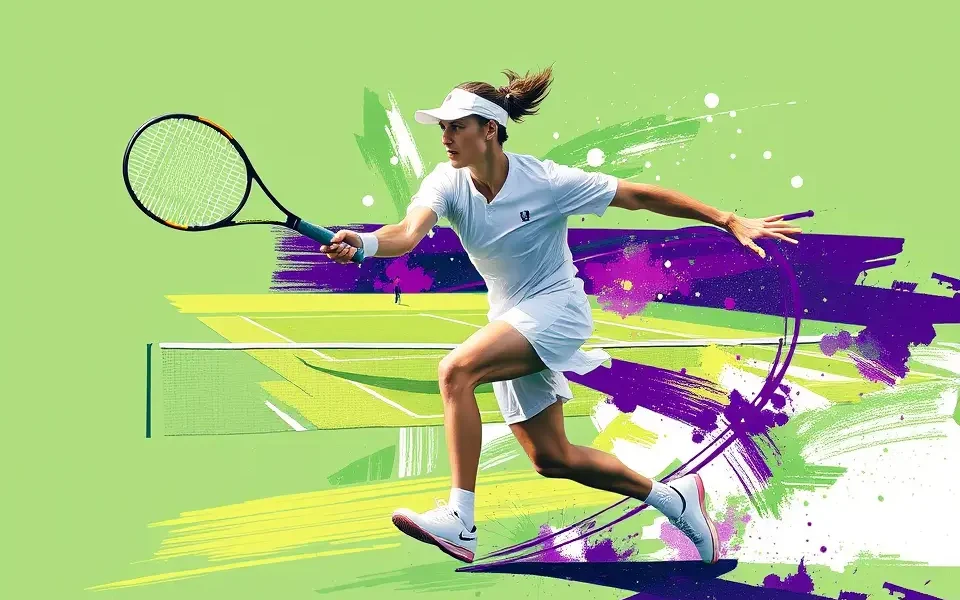The allure of Wimbledon and the unique demands of grass-court tennis have consistently spotlighted a special breed of player. Since the Open Era began in 1968, certain athletes have distinguished themselves through their mastery of the slick lawns, impeccable serve-and-volley skills, and tactical acumen. While many talented players have graced the All England Club, a select few have ascended to legendary status, their names forever etched in the annals of tennis history. This article delves into the careers of some of the greatest male grass-court players of the Open Era, focusing on their achievements, playing styles, and lasting impact on the game, with a close look at Roger Federer, Novak Djokovic, and Bjorn Borg.
Roger Federer: The Epitome of Grass-Court Grace
Roger Federer is widely regarded as the greatest male grass-court player of all time, and with good reason. His record at Wimbledon speaks for itself:
- Wimbledon Titles: An unparalleled eight (2003, 2004, 2005, 2006, 2007, 2009, 2012, 2017).
- Wimbledon Finals: Twelve appearances, demonstrating incredible consistency.
- Grass Court Titles: A stunning 19 career titles on grass.
- Grass Court Win Percentage: An impressive 86.9% (192-29).
- Consecutive Wimbledon Titles: Five consecutive titles from 2003-2007, equalling Bjorn Borg’s record.
- Longest Grass Court Winning Streak: Holds the record for the longest tour-level grass-court winning streak in the Open Era with 65 consecutive wins from 2003 Halle to 2008 Wimbledon.
- Most Wimbledon Wins: Holds the record for most Wimbledon wins with 105.
Federer’s success on grass stems from a combination of factors. His fluid movement, elegant style, and aggressive net play are perfectly suited to the surface. He possesses a pinpoint serve, a lethal forehand, and exceptional court sense, allowing him to dictate rallies and exploit his opponents’ weaknesses. Beyond his technical skills, Federer’s mental fortitude and unwavering belief in his abilities have been crucial to his success at Wimbledon.
Federer’s impact on grass-court tennis extends beyond his impressive statistics. He has inspired a generation of players with his grace, sportsmanship, and dedication to the game. His rivalry with Rafael Nadal, particularly their epic 2008 Wimbledon final, is considered one of the greatest matches in tennis history, showcasing the drama and excitement that grass-court tennis can produce. Federer’s influence can still be seen today with players attempting to emulate his attacking style of play.
Novak Djokovic: The Relentless Champion
Novak Djokovic stands alongside Federer as one of the greatest grass-court players of the Open Era. While his playing style may not be as naturally suited to grass as Federer’s, Djokovic’s relentless determination, exceptional return of serve, and incredible court coverage have made him a formidable force at Wimbledon:
- Wimbledon Titles: Seven (2011, 2014, 2015, 2018, 2019, 2021, 2022).
- Dominance: Between 2018 and 2022, Djokovic won four straight Wimbledons.
- Triple Career Grand Slam: Djokovic is the only player to win at least 3 majors across all three different surfaces (hard, clay and grass).
Djokovic’s success on grass is a testament to his adaptability and unwavering commitment to excellence. He has honed his serve-and-volley skills, improved his net game, and developed a tactical approach that exploits the unique characteristics of grass courts. His mental strength and ability to perform under pressure have also been key to his triumphs at Wimbledon, where he has overcome numerous challenging opponents and difficult situations.
Djokovic’s impact on grass-court tennis is significant. He has raised the bar for athleticism and consistency on the surface, demonstrating that a baseline-oriented game can be highly successful at Wimbledon. His rivalry with Federer, which includes three Wimbledon finals, has produced some of the most memorable matches in the tournament’s history.
Bjorn Borg: The Ice Man’s Reign
Bjorn Borg dominated Wimbledon in the late 1970s, winning five consecutive titles from 1976 to 1980. His remarkable achievements earned him the nickname “Ice Man” for his calm demeanor under pressure. Borg’s key accomplishments include:
- Consecutive Wimbledon Titles: Five (1976-1980).
- Channel Slam: He is the only male player to achieve the Channel Slam (winning French Open and Wimbledon in the same year) thrice.
- Winning Streaks: Borg holds the second-longest Open Era winning streak on grass courts with 41 consecutive wins from Wimbledon 1976 to Wimbledon 1981.
Borg’s success on grass was built on a foundation of exceptional athleticism, unwavering focus, and a groundbreaking playing style. He was one of the first players to consistently use heavy topspin from the baseline, a tactic that proved highly effective on the fast, low-bouncing grass courts of Wimbledon. His mental toughness and ability to remain composed under pressure were also crucial to his success, earning him the respect and admiration of his peers and fans.
Borg’s influence on grass-court tennis is undeniable. He demonstrated that a baseline-oriented game could be highly successful at Wimbledon, paving the way for future generations of players who relied on consistency and court coverage. His rivalry with John McEnroe, particularly their epic 1980 Wimbledon final, is considered one of the greatest matches in tennis history, showcasing the drama and excitement that grass-court tennis can produce.
Pete Sampras: Serve-and-Volley Perfection
Pete Sampras, often hailed as one of the greatest serve-and-volleyers of all time, dominated Wimbledon throughout the 1990s. “Pistol Pete” secured seven Wimbledon titles (1993-1995, 1997-2000), showcasing his exceptional skills on the fast-paced surface.
- Wimbledon Titles: Seven (1993-95, 1997-2000).
- Wimbledon Finals Record: Sampras is 7-0 in Wimbledon finals.
- Consecutive Wimbledon Titles: He is the only male player to win 3 or more consecutive Wimbledon titles twice in his career (1993–1995, 1997–2000).
Sampras’s success stemmed from his powerful and precise serve, which he often used to set up easy volleys. His athleticism, court coverage, and competitive spirit made him a force to be reckoned with on grass.
Other Notable Grass-Court Players
While Federer, Djokovic, Borg, and Sampras stand out as the most dominant grass-court players of the Open Era, several other players have achieved significant success at Wimbledon and deserve recognition:
- Rod Laver: While two of Laver’s four Wimbledon titles came in the Amateur Era, he won two more in 1968 and 1969, at the start of the Open Era. Laver is the only player to win the calendar-year Grand Slam twice, including once in the Open Era (1969). He also had a 31-match winning streak at Wimbledon.
- John McEnroe: McEnroe’s serve-and-volley prowess and fiery temperament made him a formidable opponent on grass. He won three Wimbledon titles (1981, 1983, 1984).
- Stefan Edberg: The Swede’s elegant style and attacking game were well-suited to grass. He won two Wimbledon titles (1988, 1990).
- Andy Murray: Murray ended Britain’s 77-year wait for a male Wimbledon champion, winning the title in 2013 and again in 2016.
- Rafael Nadal: Although primarily known for his dominance on clay, Nadal reached five Wimbledon finals, winning the title in 2008 and 2010.
Conclusion
The grass courts of Wimbledon have served as the stage for some of the most memorable moments in tennis history. The players discussed above represent the pinnacle of grass-court excellence, each leaving their unique mark on the game. From Federer’s elegance to Djokovic’s resilience, Borg’s coolness, and Sampras’s serve-and-volley mastery, these legends have captivated audiences and inspired generations of players. As the sport continues to evolve, their achievements will continue to be celebrated, and their influence will be felt for years to come.








No Comment! Be the first one.